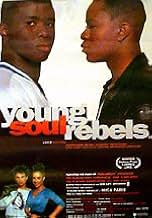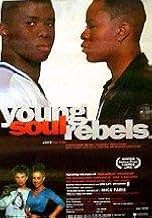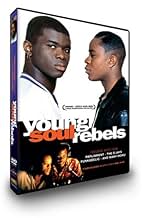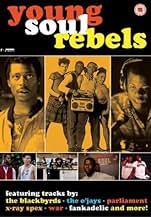Adicionar um enredo no seu idiomaTwo disc jockeys have a friend's murder to solve in the fringe-group melting pot of 1977 London.Two disc jockeys have a friend's murder to solve in the fringe-group melting pot of 1977 London.Two disc jockeys have a friend's murder to solve in the fringe-group melting pot of 1977 London.
- Direção
- Roteiristas
- Artistas
- Prêmios
- 1 vitória no total
Eamonn Walker
- Carlton
- (as Eamon Walker)
- Direção
- Roteiristas
- Elenco e equipe completos
- Produção, bilheteria e muito mais no IMDbPro
Avaliações em destaque
Unfortunately by choosing to set the film in such a specific time it has lost relevance. Added to the utterly clunky script and the dire and wooden acting it makes me wonder if and how the film ever was a success.
The murder angle was a complete mystery to me. Why did it happen? How come the victim didn't recognise the killer? That the murder and its (sort of) solving framed the film seemed totally extraneous. Why didn't Chris also get murdered?
Between this we got a disconnected story of a couple of black lads one of whom was openly gay and seemingly not getting stick for it on his rough council estate.
Lovemaking scenes - both gay and straight ones - were vastly unconvincing especially between Caz and his new punk amour. After this latter all I could think was "Was that all?".
I watched this because of an article in the Guardian detailing the "20 Best LGB Films". A couple of the choices on the list surprised me and I didn't think they deserved to be there. Nor does this dreadful effort either.
The murder angle was a complete mystery to me. Why did it happen? How come the victim didn't recognise the killer? That the murder and its (sort of) solving framed the film seemed totally extraneous. Why didn't Chris also get murdered?
Between this we got a disconnected story of a couple of black lads one of whom was openly gay and seemingly not getting stick for it on his rough council estate.
Lovemaking scenes - both gay and straight ones - were vastly unconvincing especially between Caz and his new punk amour. After this latter all I could think was "Was that all?".
I watched this because of an article in the Guardian detailing the "20 Best LGB Films". A couple of the choices on the list surprised me and I didn't think they deserved to be there. Nor does this dreadful effort either.
I am currently writing a paper on this film and another for one of my film classes, Topics in National Cinemas, as it was one of the films we examined. While perusing this page for certain information I needed i happened to read the previous comment that someone had posted regarding what they thought of the film.
While reading this individual's comments it occurred to me that they COMPLETELY misunderstood the film and what it set out to challenge and address. This film is NOT a murder mystery. Yes, a murder occurs and sets off the story, but it is no more essential to the plot than is the youth in a coma in La Haine (Kassovitz, 1995). Like La Haine, this film sets out to address social issues pertaining to race, class, positioning in the political landscape, and, unlike La Haine, sexuality (which seemed to greatly disturb the previous individual who posted).
Young Soul Rebels examines the social landscape of late 1970s Britain, and particularly how it affects youths within the greatly marginalized "Black" culture. It confronts issues of diaspora, through the juxtaposition of different aspects of the "Black" culture, as in the rastas working at the garage, compared with the two, funk obsessed (and much more "Afro-English") main characters. It also looks at the intersection at which certain sub-cultural borders collide, as in the Punks, the Funks, and the Reggaes, as well as Hetero and Homosexuality. Ultimately this notion of collision is key to understanding this film for what it is, which is precisely identities in collision. If the previous individual who posted had understood this, then they would have also seen how the murderer's motives implied this idea of identity collision, were driven by it and pertained more to it than to reading the film as a simple "whodunnit." In this light, you'll also find that music drives the film, both as a signifier for identities, and as an expression of them. Music is certainly an essential component to this film.
For more information regarding the issues this film juggles, and for a greater understanding of its concepts and meanings, look at the writings of Paul Gilroy, particularly his book "Ain't No Black in the Union Jack," and the film's director, Isaac Julien.
While reading this individual's comments it occurred to me that they COMPLETELY misunderstood the film and what it set out to challenge and address. This film is NOT a murder mystery. Yes, a murder occurs and sets off the story, but it is no more essential to the plot than is the youth in a coma in La Haine (Kassovitz, 1995). Like La Haine, this film sets out to address social issues pertaining to race, class, positioning in the political landscape, and, unlike La Haine, sexuality (which seemed to greatly disturb the previous individual who posted).
Young Soul Rebels examines the social landscape of late 1970s Britain, and particularly how it affects youths within the greatly marginalized "Black" culture. It confronts issues of diaspora, through the juxtaposition of different aspects of the "Black" culture, as in the rastas working at the garage, compared with the two, funk obsessed (and much more "Afro-English") main characters. It also looks at the intersection at which certain sub-cultural borders collide, as in the Punks, the Funks, and the Reggaes, as well as Hetero and Homosexuality. Ultimately this notion of collision is key to understanding this film for what it is, which is precisely identities in collision. If the previous individual who posted had understood this, then they would have also seen how the murderer's motives implied this idea of identity collision, were driven by it and pertained more to it than to reading the film as a simple "whodunnit." In this light, you'll also find that music drives the film, both as a signifier for identities, and as an expression of them. Music is certainly an essential component to this film.
For more information regarding the issues this film juggles, and for a greater understanding of its concepts and meanings, look at the writings of Paul Gilroy, particularly his book "Ain't No Black in the Union Jack," and the film's director, Isaac Julien.
I saw this film shortly after it's release, and felt quite cheated. It's title and advertising gave me the impression that it would be about the black DJ sound systems and soul scene which was at it's height in England during the late '70s and early '80s. But this only took up a fraction of film time. Instead, I had to sit through a convoluted sub-plot featuring a murder mystery which appeared all of a sudden during the movie, a very gratuitous gay sex scene, and generally bad acting and direction. There were a few moments where the protagonists had brushes with the law, and I thought at last this film was going somewhere and would depict the racism of the justice system accurately. But this was not the case, and these scenes appeared to have been either badly written, or edited. And when one character deceides to carry out his own murder investigation, I found it laughable. I understand that no film can be 100% accurate when depicting an era or events around it, and that it should be entertaining to the viewer. But at least a good attempt should be made to get the basics right. For example, hardly any of the black male actors sported an afro hairstyle or wore flares, which would have been as common as a rainy day in London during 1977. Blacks mixing with Punks? I'm no sure about that. They would have considered a lot of Punks to be similar to the skinheads which carried out a lot of racist attacks at that time. Also another sex scene featuring Sophie Okenedo and Valentine Nonyela, was not handled well at all, and was certainly not as explicit as the previous gay sex scenes which says a lot about it's director. By trying to show that homosexuality in the black british community is opposed more than in the white, I feel is absolute nonsense. Homophobia has no colour preference, and being black, it's director Isaac Julien should know better really.
firstly this film has some mistakes in it,i was a soul girl back int he day,punks and soul boys weren't pally,but not enemies either,the didn't go to the same clubs,the fashion is correct but the music is out of time ,some of the music came out maybe up to 2 years later,that apart it does pick up the atmosphere of the day and the vibe and is at least acknowledging the soul scene,and the cult of soul boys and girls ,a major thing,but very unknown which is odd,i guess the write must have a bit of info of the movement,still as a fun film its OK and does bring a few
memories i think unless you were part of the scene you would find this
a bit dull,it is hollow ,but the clothes and dancing are all spot on,although gay guys did have there own disco clubs,again fairly underground as back then it wasn't as tolerated as it is,rightly so,now as so many other films have been made about punks and skinheads it god to see a movie reflecting a little known but extremely popular movement
memories i think unless you were part of the scene you would find this
a bit dull,it is hollow ,but the clothes and dancing are all spot on,although gay guys did have there own disco clubs,again fairly underground as back then it wasn't as tolerated as it is,rightly so,now as so many other films have been made about punks and skinheads it god to see a movie reflecting a little known but extremely popular movement
Johnny Mills , as one of the skinhead kissing gay punks in the night club , is the highlight of this movie. He also appeared with Tilda Swinton in Derek Jarman's The Garden 1990.
Você sabia?
- CuriosidadesThe film takes place in 1977.
- Erros de gravaçãoThe two punk bands GBH and Conflict weren't around in 1977.
- Trilhas sonorasP. Funk Wants To Get Funked Up
Performed by Parliament
Licensed Courtesy of Casablanca Records Inc/Polygram Records Inc (New York)
Principais escolhas
Faça login para avaliar e ver a lista de recomendações personalizadas
- How long is Young Soul Rebels?Fornecido pela Alexa
Detalhes
Bilheteria
- Faturamento bruto nos EUA e Canadá
- US$ 225.664
- Fim de semana de estreia nos EUA e Canadá
- US$ 2.609
- 24 de nov. de 1991
- Faturamento bruto mundial
- US$ 225.664
Contribua para esta página
Sugerir uma alteração ou adicionar conteúdo ausente




























